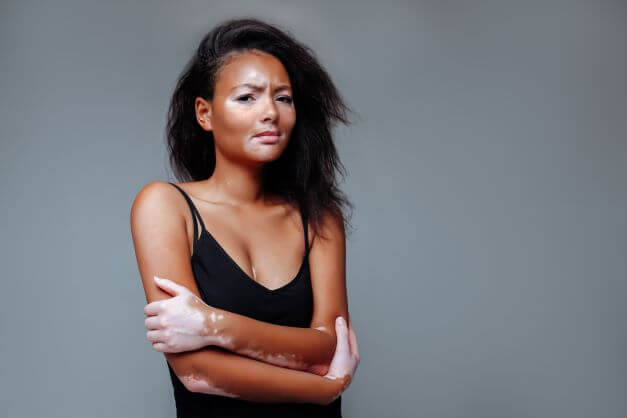There are many ways that our mental health impacts our physical health. When we’re nervous, our heart beats faster. When we’re upset, our stomach hurts. While these physical responses to our thoughts and emotions seem obvious, few people would think that connection goes both ways. According to Dr. Megan Lent of U.S. Dermatology Partners in Chillicothe, Missouri, “Current research in the field of dermatology says that as much as a quarter of people who have chronic skin conditions are also diagnosed with depression and anxiety. For others, increased cortisol levels related to chronic stress trigger skin disease flare-ups, including acne breakouts. It’s important to understand that these reactions go both ways. A good dermatologist can help you understand the source of your skin health concerns and find the best treatments to manage skin disease and mental health.” In this blog, Dr. Lent walks through the link between chronic skin conditions and mental health and the importance of addressing both.
Links Between Skin Conditions & Mental health
According to Dr. Lent, “The research into what professionals call psychodermatology shows that there are three ways that skin health and mental health are commonly interrelated. The first is that skin concerns can be worsened by mental health struggles. For instance, the way that raised cortisol levels from stress makes acne breakouts worse. The second is psychological struggles linked to the ways that skin conditions negatively impact appearance. For example, psoriasis can be very marring to the appearance, causing people to experience low self-esteem. The third link is skin manifestations of psychiatric disorders. This is what is referred to as a somatoform reaction. It’s a physical symptom that does not have a direct link to a medical condition. A common skin-related somatoform reaction is delusional parasitosis. This is a psychiatric condition where a person believes they are host to parasites like bugs and mites. This leads to a manifestation such as skin itching, redness, lesions, and other serious skin health issues.” The impact of skin health on mental health can manifest in numerous ways, including:
- Severe acne breakouts – acne breakouts, especially those that are severe or treatment-resistant, can be disfiguring, making people feel less confident or experience mental health concerns like social anxiety due to embarrassment about their breakouts. Acne breakouts can also become more severe as a result of certain mental health conditions like chronic stress or anxiety.
- Eczema & Dermatitis – these are umbrella terms that describe a number of skin conditions that cause skin redness, inflammation, and irritation. This skin condition can also be exacerbated by stress hormones like cortisol, especially when stress is chronic. The cortisol overproduction can make it much harder to manage eczema as it decreases immune function, leading to more inflammation. Eczema can also be unsightly and uncomfortable, keeping those with this condition from participating fully in activities and engaging with their loved ones.
- Psoriasis – this condition can significantly impact the appearance, but it also affects a person’s ability to function on a daily basis. It’s a chronic inflammatory disease that can lead to debilitating pain, itching, and discomfort that can be extremely difficult to manage. Those with psoriasis are at significantly higher risk for anxiety and depression. This often stems from how difficult it is to manage psoriasis, which can be frustrating and limit a person’s ability to thrive.
- Rosacea – the side effects of this skin condition are written all over your face – literally. The most common symptom of rosacea is redness of the cheeks. More severe forms of rosacea can also cause acne-like pustules and the overproduction of skin cells that develop into large bumps and malformations on the skin’s surface. These physical changes can lead to increased risk for depression, social anxiety, withdrawal and isolation, and negative feelings of self-worth.
How to Improve Skin Health with Emotional & Mental Health
When it comes to caring for skin conditions related to mental health, Dr. Lent says, “The most important thing you can do is put together a team of caregivers that includes mental health professionals and dermatologists. In order to clear up the skin effects of mental health, you have to also be working on your emotional and cognitive well-being. In order to achieve mental health goals, you also need to manage their impact on your skin. These are cooccurring conditions, and treating only one of these concerns will never lead to full health. Both conditions need to be managed together to look and feel your healthiest.” In addition to working with therapists and other mental health professionals to help you address mental health conditions, you should also partner with a dermatologist to achieve healthier skin. Each person’s skin health needs will vary, but some of the options people should consider include:
- Create a skincare routine – you should work with a dermatologist to choose products and develop a daily skincare routine to avoid breakouts and flare-ups in chronic skin conditions and to treat skin during flare-ups. You should also discuss adjusting your skincare routine during seasonal changes.
- Review your skincare products – as part of your skincare routine development, you should review all of your skincare products, cosmetics, household cleansers, and other products with your dermatologist. Get rid of any products that may trigger flare-ups and replace them with more skin-friendly options. An example would be the Colorescience All Calm Multi-Correction Serum, a lightweight, daily serum that soothes and hydrates skin while improving skin tone and texture.
- Schedule dermatology visits during flare-ups – as soon as you notice signs of a flare-up in acne, eczema, rosacea, psoriasis, or other chronic skin conditions, schedule a visit with your dermatologist. When flare-ups are in the early stages, it may be possible to quickly clear up the condition and prevent more severe flare-ups or breakouts in the future.
- Visit a dermatologist at least once each year – annual skin examinations are an important part of maintaining healthy skin. Visiting a dermatologist at least once each year ensures you maintain the healthiest skin possible and reduces your risk for flare-ups of chronic skin conditions.
Talk to a Dermatologist
If you want to learn more about how to improve your skin health alongside your mental health, don’t hesitate to reach out to a local U.S. Dermatology Partners office. Our skilled dermatologists can help you understand how your specific skincare needs can be met. We make getting started working with us quick and easy. Just take a few moments to complete our online scheduling request form. Once our local dermatology team hears from you, they’ll be in touch to finalize your visit.
Find a location near me
or


